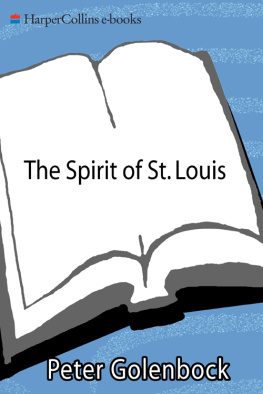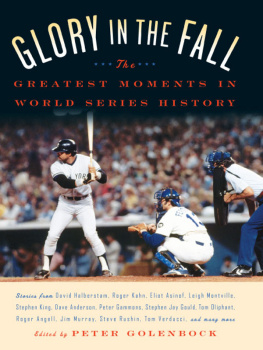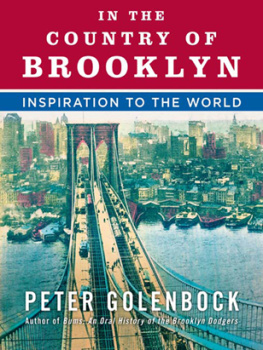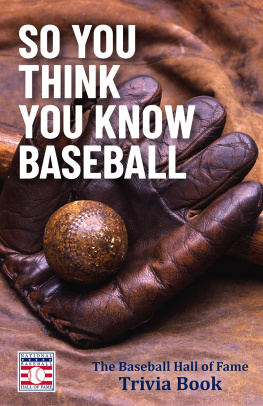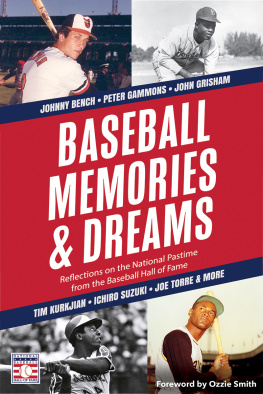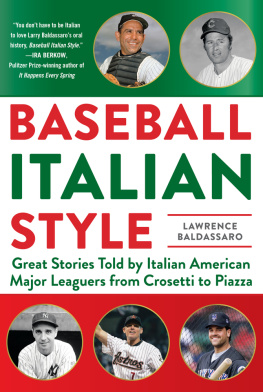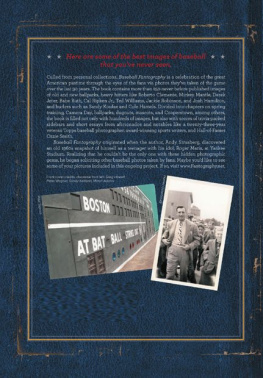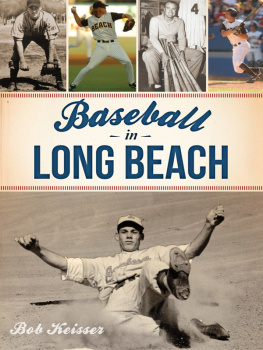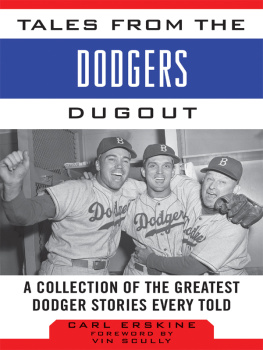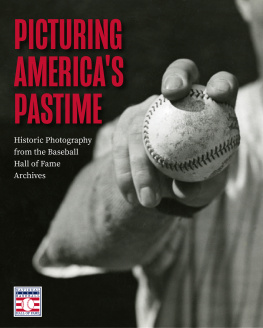Peter Golenbock has written more than sixty books, including ten New York Times best sellers. Among his best-selling books on baseball are Dynasty: The New York Yankees, 19491964; The Bronx Zoo (with Sparky Lyle); Number 1 (with Billy Martin); Bums; Balls (with Graig Nettles); Wrigleyville; The Forever Boys; Fenway; Amazin; Idiot (with Johnny Damon); and House of Nails (with Lenny Dykstra).
I thought, Christ, Ill be able to throw forever. I have the right combination of guts, pitching when the chips are down. Im better in big ball games.
Jim Bouton
O ne of the joys of writing Dynasty, my history of the New York Yankees of the 1950s and early 60s was becoming close with pitcher Jim Bouton and his family. I was living in Englewood, New Jersey, as he did, and after our initial meeting we became like brothers. He and his wife, Bobbi, and I and my wife would go out, and before long we would babysit their three young children, Michael, David, and Laurie, whom everyone called Twink. Jim invited me to play on the CBS All-Star softball team starring Jim Jensen, and I ended up playing for CBS for six seasons, traveling the tristate area playing top semipro, police, fire, and charity teams. Jim and I raced our Fiats on the street and raced go-karts at amusement parks. I never won a race. One evening, he and Mike Kekich and I went to a local poorly lit high school gym, where I caught Kekichs ninety-mile-an-hour fastball and Jims dancing knuckleball. In the summer of 1978, he invited me to come to Atlanta to watch him pitch a game against the Dodgers.
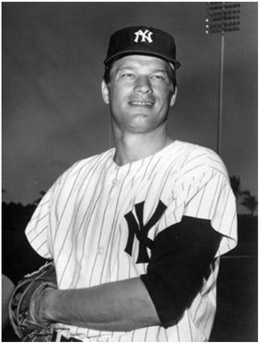
Jim Bouton. National Baseball Hall of Fame
Jim Bouton: I was not considered a big prospect at all. I pitched for Boone Township High School and bloomed late. I hardly pitched at all as a junior in high school. I was small, about 5-foot-10, 145 pounds. I didnt develop until college.
My senior year in high school, I pitched in a semifinal game for the state [Michigan] championship. Maywood High School beat us 21 in 13 innings. They went on to win the [1957] state championship. After I lost in 13 innings, I pitched that summer for a team called the Chicago Yankees; strangely enough, no relationship to the real Yankees. We played about an eighty-five-game schedule, and I was one of four pitchers, and I learned a lot that summer. I got pretty good, so I played my freshman year at Western Michigan, and then I pitched for the Chicago Yankees again.
At the end of that summer, I pitched in a tournament in Battle Creek. I was the fourth pitcher. We had college phenoms like Jim Hansen, guys you dont know, but they were big names at the time. I pitched against the team that ended up winning it in double elimination, and I beat them 20, a twohitter, and it was the only game they lost. It was the first time scouts really took an interest in me. Before that, they considered me too small, too thin, not enough fastball. I was seen as a gutsy pitcher but without enough stuff. But after this particular game, they started to take an interest in me. Six or seven clubs were talking about me signing a big bonus contract. This was the finals of the tournament, the best teams from all over the country played, so all the scouts were there.
I drove home right after the tournament was over, and all the scouts were saying, Were going to call you. It was about a four-hour drive to my house. I got home. My dad was playing bridge.
Hey Dad, I said, I pitched a two-hitter in a tournament, and scouts are talking about paying me a bonus.
My dad said, Two spades.
No, Im not kidding you, Dad. Theyre going to call any minute now. How much money should I tell them Id sign for?
Still not believing, he threw out a number.
Tell them fifty thousand dollars, he said.
There had never been any interest in me before, he felt, so why should there be any interest in me now?
Two seconds later, the phone rings. It was a scout from the Philadelphia Phillies.
Fifty thousand dollars, I told the scout.
Dad, I told him $50,000.
He said, What did he say?
He wants to fly me to Philadelphia for a workout.
At that point, my dad began to take it seriously.
I went to Detroit to work out. I flew to Philadelphia. In each case, they told me I was too small. Other teams: St. Louis, Cincinnati, never wrote back, never called. So now Im going back to college. I was really disappointed.
My dad tried one more trick: the fake letter gambit. We wrote a form letter. Dear blank. My son is prepared to sign a major league contract by Thanksgiving. If youre interested please have your bid in, otherwise youre not going to be able to sign him. Yours truly, George Bouton.
He sent the letter to twelve clubs, including the Yankees.
The Yankees, afraid of losing me to somebody, offered me $30,000 for three years, about $10,000 a year. I was signed by Art Stewart, who knew the talent in the Chicago area. I was the first guy he signed.
I played three years in the minor leagues. I had an Amarillo contract, and I was not expected to make the Yankees in 62. I was probably going to Richmond when I went to spring training with twelve other pitchers from the minor leagues. Our job was to get in the game for a look-see. And I got lucky.
The Yankees and the Cardinals were playing in St. Petersburg. I was supposed to pitch the ninth inning, and I did, and we tied it up, so I pitched the 10th inning, and then I pitched the 11th inning, and the 12th, until I finally lost it in the 13th on an error. I had pitched four innings without giving up a run, and because of that I got another opportunity. They gave me enough rope to hang myself. They gave me a couple more chances to pitch, and I did well again, and [Ralph] Houk finally gave me a start, and I pitched five or six innings, and because I had one of the best pitching records for a rookie, or anyone else, they kept me and Robin Roberts. They were going to keep one of us.
Roberts wasnt impressive in the spring or on the sidelines. Robin had to get into a game to show how impressive he was. The spring was for the young, hard-throwing kids.
The Yankees went north, and I pitched a couple of innings in relief, and I got a starting opportunity against the Washington Senators just before cutdown. And I pitched a shutout. It was the worlds worst shutout. I walked seven guys and gave up seven hits. You pitched a shutout, kid, but you wore out the whole bullpen, Houk told me afterward.
In spring training, they dont tell you until the last minute whether youre going to make the club. There were ten marginal guys who all have their bags packed, who have made the travel arrangements for their wives, and then they show up on the last day, and you hear, Ralph Houk wants to see ya, and Ralph says, Youre not going north with the club. Or youd be in front of your locker, and the clubhouse guy has packed everybodys bag to travel north but yours. Thats how you knew you were going to the minors.
They cut Roberts and kept me. And I spent most of the year as a relief pitcher. [In 1962, Bouton had a 77 record with a 3.99 ERA.]
I didnt start regularly until the following year when Bill Stafford came down with a rash in Baltimore one day in May. Stafford broke out in hives. Just one of those freak things. I was only supposed to pitch in that one game, and I won, so I stayed in the rotation. It really didnt matter to me whether I started or not. At that point in my career, I was just happy to be there and do anything they wanted me to do.
Our pitching coach was Johnny Sain, and I thought Johnny was terrific. He was a great pitching coach and a fine person, mostly giving me confidence. One of the best things coaches can do to big league athletes is leave them alone. So many coaches exert negative influence on players. If there is no influence at all, it can be positive. [Manager] Ralph Houk and Sainthe best things they contributed was the fact that they didnt bug you too much. They just left the guys alone. They didnt hassle us on running. Didnt hassle us on curfew, didnt hassle us on Mickey Mouse shit that other coaches would bug guys about. For that reason alone, they were very good.



